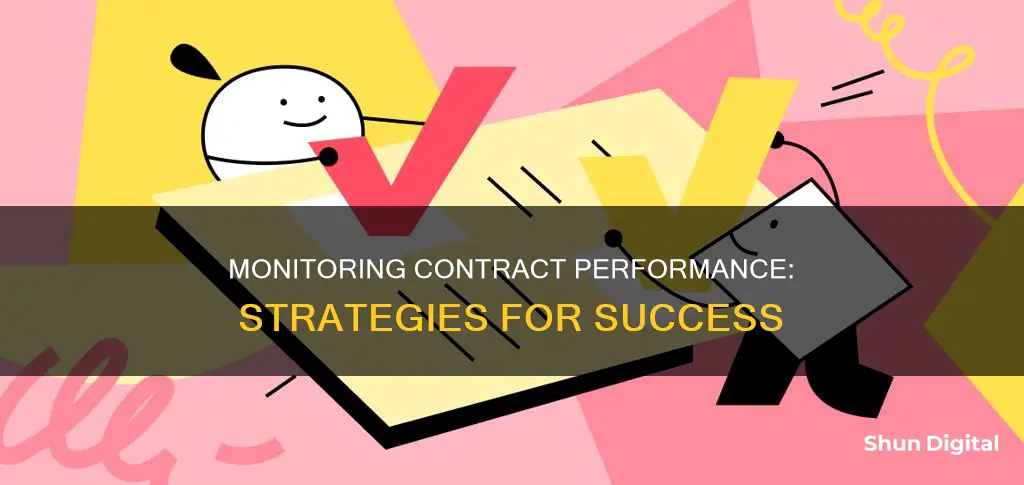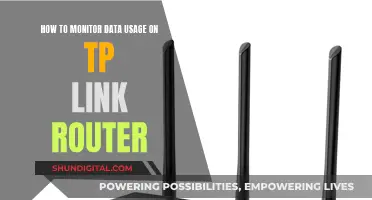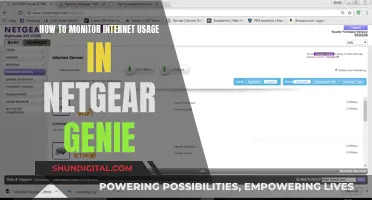
Contract monitoring is crucial for businesses to ensure they are realising the expected benefits of their agreements. It is a way to confirm that the contractor is performing their duties and fulfilling the terms of the agreement. This process can help identify different types of risks from third parties, such as poor contract and vendor performance, unfulfilled obligations, and potential non-compliance with regulations. To effectively monitor contract performance, businesses should centralise contract information, conduct routine reviews, and utilise contract management software to stay on top of key dates and milestones.
What You'll Learn

Centralise contract information
Centralising contract information is a critical step in effective contract monitoring. This involves storing all contracts and related documents in a single, secure location, often referred to as a contract repository. This ensures that teams have easy access to accurate and up-to-date information, streamlining the monitoring process and simplifying the search and review of contractual documents.
To centralise contract information, companies can utilise contract management software that enables the secure upload and storage of executed contracts. These platforms allow for the organisation of contracts into folders and subfolders, providing a reliable source of truth about the company's contract portfolio. Additionally, companies should ensure that all certificates, documentation, and amendments are kept in this central repository. This simplifies the overall contract management workflow and enhances collaboration among teams.
Role-based permissions can be set within the platform to provide relevant teams with access to the information they need. This prevents teams from spending valuable time searching for documents and ensures that everyone is working with the same set of data. Centralising contract information also makes it easier to prove compliance during audits, as all relevant documentation is readily available.
By centralising contract information, companies can improve visibility and control over contract milestones, compliance, and overall performance. It enables teams to easily identify key dates, risks, and expiring documents, facilitating proactive monitoring and ensuring timely compliance with contractual obligations.
In addition to centralising contract information, companies should also consider implementing a consistent contract monitoring plan. This plan should include routine monitoring, enhanced monitoring for high-risk contracts, and periodic business reviews to assess contractor performance and discuss opportunities for improvement.
How LCD Screens Emit Light
You may want to see also

Monitor for risk
Monitoring contracts is crucial to ensure that the expected benefits of the agreement are realised. Without monitoring, different types of risks could go undetected and impact outcomes. These risks include poor contract and vendor performance, unfulfilled obligations, and the potential for non-compliance with regulations. Therefore, it is essential to monitor for risk throughout the contract's lifecycle. Here are some ways to effectively monitor for risk:
Conduct a Risk Assessment
The Office of Contracts and Procurement (CNP) should collaborate with the Departmental Contract Administrator to develop a Contract Risk Assessment. This assessment identifies risk elements associated with the contract and helps establish a monitoring plan. The risk assessment considers various areas, including data security, intellectual property issues, safety, and contract specifics.
Implement Routine and Enhanced Monitoring
Routine monitoring involves addressing medium-risk factors and is typically handled by the Departmental Contract Administrator. They develop a written monitoring plan, which includes routine check-ins and reviews of reports submitted by the contractor. Enhanced monitoring, on the other hand, is necessary when "High Risk" items are identified. In this case, the CNP actively collaborates with the Departmental Contract Administrator and maintains direct involvement in meetings and reports.
Utilise Performance Monitoring Tools
Performance monitoring tools help confirm that the contractor is fulfilling their duties and obligations as per the contract terms. These tools can include reporting and testing, which assure the ability to enforce contract compliance. Additionally, these tools can help identify the contractor's needs for technical assistance and provide valuable insights into the effectiveness and quality of the goods or services provided.
Centralise Information and Provide Access
Centralising contracts and relevant items in a secure location ensures easy access to information. This simplifies the monitoring process and facilitates informed decision-making. It is crucial to grant access to the relevant teams to streamline collaboration and ensure efficient monitoring.
Collaborate Across Teams
Contract monitoring should be a collaborative effort. Involving teams beyond the Contract Managers or Legal Team, such as Finance Teams for monitoring contract spend, promotes a unified approach. This helps drive collaboration, embed monitoring as a standardised process, and ensure that all teams are working with the same information.
By implementing these measures, organisations can effectively monitor for risk, mitigate potential issues, and optimise the benefits derived from their agreements.
Setting Up a New Desktop Monitor: A Step-by-Step Guide
You may want to see also

Assess performance quality
Performance monitoring is a key function of contract administration. It helps to confirm that the contractor is performing all of its duties and obligations in accordance with the terms of the contract. It can also help identify and address any developing problems or issues.
To assess performance quality, it is important to decide what to monitor and by whom. This may include monitoring contract spend, time-to-signature, and other key performance indicators. Monitoring should be assigned to relevant teams beyond just the Contract Managers or Legal Team. For instance, the Finance Team should be included if monitoring contract spend.
It is also important to centralize all contracts and their relevant items in a single, secure location. This provides a reliable source of truth about the contract portfolio and ensures teams are working with accurate, up-to-date information. This can be achieved using contract management software, which also allows for the setting of role-based permissions.
Another aspect of assessing performance quality is conducting reviews and analyzing data. This involves collating data on missed contract milestones, for example, and discussing how and why it happened to prevent it from happening again. This can include desk reviews, expenditure document reviews, and periodic business reviews.
Finally, it is important to take action to protect the business. This includes identifying issues and either remedying or escalating them, evaluating relationships with suppliers, monitoring contract performance, and driving corrective action if required.
Monitoring Internet Usage on Your iPhone: A Step-by-Step Guide
You may want to see also

Hold post-award conferences
Holding post-award conferences is an important aspect of effective contract management. These conferences serve as postaward orientations, aiding both government and contractor personnel in achieving a clear and mutual understanding of all contract requirements and addressing potential issues. While they are not intended to alter the final agreement, they can facilitate necessary changes through proper procedures.
Planning the Conference
The decision to hold a post-award conference is typically made by the contracting officer, who is also responsible for the conference arrangements. This includes establishing the time and place, preparing the agenda, notifying relevant parties, and designating or acting as the chairperson. A preliminary meeting with government personnel is often conducted to ensure effective preparation.
Conducting the Conference
The chairperson of the conference is responsible for emphasising that its purpose is not to change the contract unless a contract modification is contemplated. During the conference, the contracting officer may make commitments or provide directions within the scope of their authority. Any changes to the contract resulting from the conference must be made through a contract modification process, referencing the applicable terms. It is crucial that participants without the authority to bind the government refrain from taking any actions that alter the contract.
Post-Conference Reporting
The chairperson is responsible for preparing and signing a comprehensive report of the post-award conference. This report should cover all the items discussed, including areas requiring resolution, controversial matters, the names of participants assigned responsibility for further actions, and the due dates for those actions. Copies of the report should be provided to the contracting office, contract administration office, contractor, and other relevant parties.
Benefits of Post-Award Conferences
Post-award conferences are particularly beneficial for small businesses, small disadvantaged businesses, veteran-owned small businesses, and women-owned small businesses. They help ensure that all parties have a clear understanding of the contract requirements and can address potential issues early on. This promotes effective contract execution and helps prevent issues that may lead to disputes or non-compliance.
Opening the Acer LCD Monitor H163HQ: Step-by-Step Guide
You may want to see also

Assign monitoring personnel
Assigning monitoring personnel is a crucial step in the contract monitoring process. Here are some detailed instructions and considerations for assigning personnel to monitor contract performance:
Firstly, it is important to assign personnel with the necessary skills, knowledge, and training to effectively monitor contracts. These individuals should have a strong understanding of contract management, including the ability to interpret contract terms, assess performance, and identify potential risks. They should also be familiar with the specific goods or services being provided under the contract.
In some cases, it may be beneficial to assign personnel with specific expertise related to the contract. For example, if the contract involves technical or specialised services, having personnel with a technical background can help identify potential issues or areas where the contractor may need assistance.
Once the skilled personnel have been identified, it is important to clearly define their roles and responsibilities. This includes outlining the specific contracts or aspects of contracts they will be responsible for monitoring. For example, they may be assigned to monitor a particular contractor's performance, track specific milestones or key performance indicators (KPIs), or focus on identifying and mitigating risks.
It is also essential to ensure that the assigned personnel have the necessary resources and support to carry out their duties effectively. This may include providing access to contract management software or other tools that can aid in monitoring, such as centralised repositories for contract documents and performance data.
Additionally, consider cross-functional collaboration by involving personnel from different departments or areas of expertise. For instance, including finance teams when monitoring contract spend or legal teams when monitoring time-to-signature. This promotes a collaborative approach and ensures that diverse perspectives are considered in the monitoring process.
Finally, it is recommended to conduct regular reviews of the monitoring personnel's performance. This includes evaluating their effectiveness in identifying and addressing issues, as well as their ability to work collaboratively with other teams. These reviews can help identify areas where additional training or resources may be needed and ensure that the monitoring process is optimised.
By carefully assigning monitoring personnel and providing them with the necessary support and resources, organisations can effectively track contract performance, mitigate risks, and ensure that the terms of the contract are fulfilled.
Refurbished Monitors: Worth Buying?
You may want to see also
Frequently asked questions
Contract performance is a measure of whether or not the terms of an agreement are being fulfilled. This fulfilment can be by your business, on your business's behalf, or by your vendor.
Monitoring contract performance allows you to determine the quality of the performance and assess areas of the business that are being impacted by poor contract performance. It also helps to minimise business disruption caused by late deliveries or poor-quality services.
There are several key aspects to consider when monitoring contracts, including assigning personnel with the relevant skills and knowledge, preparing a quality control review guide, attending key meetings, monitoring and evaluating contractor progress, and resolving problems.







